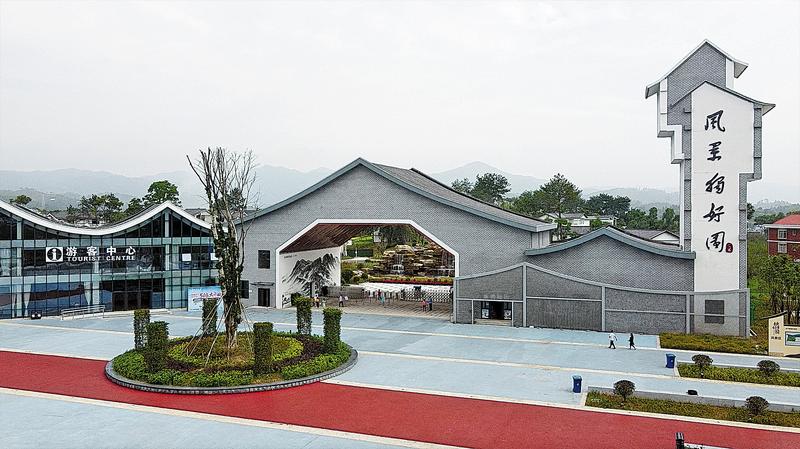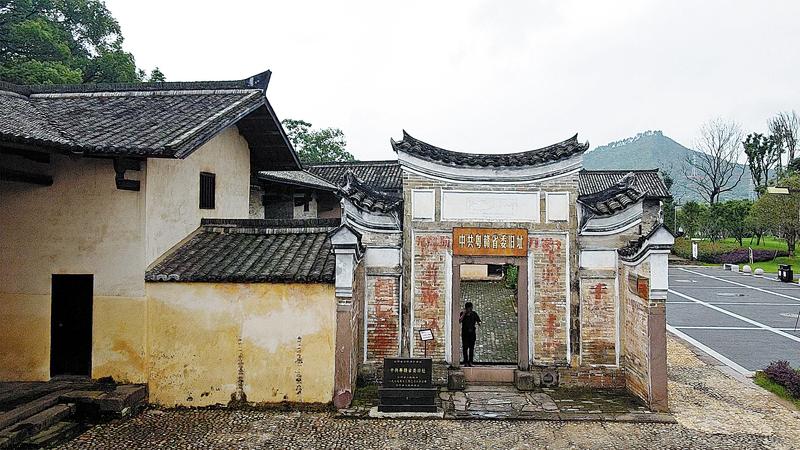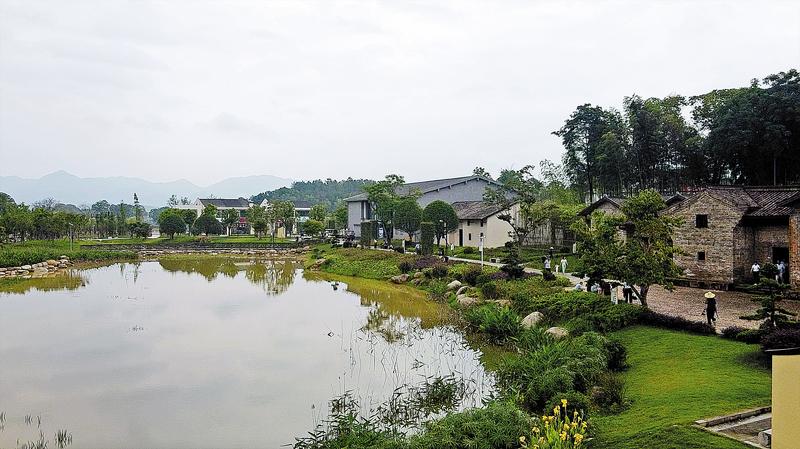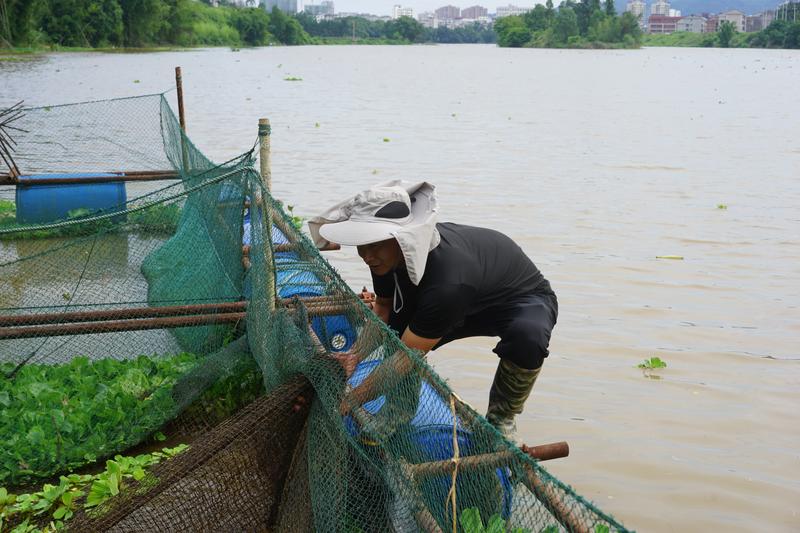The opening of a recreational park on the site of a former revolutionary base has raised local living standards. Shadow Li and Li Bingcun report from Huichang, Jiangxi.
 The facade and entrance of Fengjingduhao Park, a tourist attraction in Huichang county, Jiangxi province. (SHADOW LI / CHINA DAILY)
The facade and entrance of Fengjingduhao Park, a tourist attraction in Huichang county, Jiangxi province. (SHADOW LI / CHINA DAILY)
At 43, Zou Zeliang is finally content with life because he is living in a way he would never have dared to dream about years ago. The newlywed lives with his wife in a three-story, fully furnished detached house.
Already living in absolute poverty, Zou, from Wenwuba, a village in Huichang county, Jiangxi province, hit rock bottom after his mother died when he was young. He finally lost all hope when his father, his only close relative, died a few years ago.
"I had lost interest in everything, even my hope in life, because of the impoverished condition I lived in," Zou said.
He had worked many jobs: apprentice bricklayer; waiter; security guard; and laborer at a clothing factory in Guangdong province. Nothing lasted long because he was unable to adapt to city life.
He returned home and settled for the status quo. To add to his problems, he had injured some muscles in his abdomen while working as a bricklayer.
However, a beacon of hope came when the local government lent a helping hand.
Road out of poverty
In 2014, Zou and his father were classified as impoverished. Their old home, shabby and almost dilapidated, was close to a well-known relic of a Communist Party of China base in Jiangxi-the Yuegan provincial committee of the CPC.
The turning point came in 2016, when the local authority compensated Zou and his father after they were relocated to make way for Fengjingduhao Park, a planned tourist attraction built around the cultural relic that was aimed at boosting local tourism. He and his father were relocated to his current house, more than twice the size of the original residence, which would raise their living standards.
The subsidy for relocation was a ray of sunshine that gave Zou hope of getting out of the quagmire he had been stuck in for years.
Also that year, the local authorities helped him secure an interest-free loan of 20,000 yuan.
Using the money as a startup fund, Zou began a fish farming business. As he was starting from scratch, the local authorities provided training on how to tend to his fish in rivers and the use of e-commerce platforms to promote sales.
For the first few years, Zou had a tough time because raising fish in a river is different from raising them in ponds or lakes because the running water and the current make it more difficult technically, he said. To add to his woes, his father died in 2019, just a few days before Spring Festival. With the new house still under construction and his old home being renovated by the park authorities, Zou was forced to live alone in a tin shelter he had built on the riverside to raise fish.
This time, though, he didn't give in. Zou knew that it was his last chance and that he had reached a point of no return in his life. His perseverance paid off eventually.
He now earns 10,000 yuan (US$1,540) a year by fish farming, and he has set his sights on eventually moving his fish farming business away from the river into local ponds in line with new regulations related to environmental protection.
 A tourist visits the relic of a Communist Party of China base-the Yuegan provincial committee of the CPC, a key site in the park, in May. (SHADOW LI / CHINA DAILY)
A tourist visits the relic of a Communist Party of China base-the Yuegan provincial committee of the CPC, a key site in the park, in May. (SHADOW LI / CHINA DAILY)
Revolutionary base
Zou's was one of 130 households relocated for the park, whose name Fengjingduhao translates into English as "the landscape here is beyond compare", a line from a poem called Qing Ping Yue Huichang, written by Chairman Mao Zedong in Huichang during the summer of 1934.
The 420,000-square-meter park lies one kilometer from the county's downtown. Construction started in 2018. Based on the old revolutionary base, it incorporates the former residence of Mao and a replica of the former home of leader Deng Xiaoping, chief architect of the reform and opening-up policy, which originally stood a few kilometers distant.
Ninety traditional Gannan-style houses have been preserved and renovated for use as eight exhibition halls to showcase the county's rich history as a revolutionary base.
In 1927, the People's Liberation Army was formed after the Nanchang uprising on Aug 1 that year, which had been initiated by the CPC to counter purges by the Kuomintang. The PLA's victory in a battle at Huichang, a key junction of Jiangxi, Fujian and Guangdong provinces, was its first over the KMT after the uprising.
 A view of Fengjingduhao Park, which is built upon several old CPC bases. Chairman Mao Zedong's old residence, where he lived during his short stay in Huichang county, is also in the park. (SHADOW LI / CHINA DAILY)
A view of Fengjingduhao Park, which is built upon several old CPC bases. Chairman Mao Zedong's old residence, where he lived during his short stay in Huichang county, is also in the park. (SHADOW LI / CHINA DAILY)
Xiao Chenglin, deputy director of the management office at the former site of the provincial committee, said the combination of Red tourism, green attractions and traditional local culture means the park offers a special experience for tourists.
The Gannan-style architecture features an original house in the middle of the park. Traditionally, the houses were expanded on the left and right wings when the owner had children. The expansion continued when the children married and started their own families. All the rooms are connected by doors, but the houses remain independent when the doors are closed.
The renovated clay houses dot the park's meadows. At the old site of the Yuegan provincial committee of the CPC stands a facade with the name of the building at the entrance.
The park has played an important role in the county's efforts to improve its tourism industry. It was built with a view to link up with other scattered tourist attractions across the county.
"If tour groups come to see the beautiful views at our park and then look at the traditional Gannan-style houses, it will take them half a day. With other local attractions, tourists can stay in Huichang for a whole day, boosting Red tourism (visiting historical sites with a modern revolutionary legacy)," Xiao said. "We want to boost the tourism industry and build the county into a substantial national base for patriotic education as well as a famous travel destination."
Nearly 400,000 people, close to the population of Huichang, have visited the park since January.
 Fish farmer Zou Zeliang tends to his farm on a river in Huichang, in May. (SHADOW LI / CHINA DAILY)
Fish farmer Zou Zeliang tends to his farm on a river in Huichang, in May. (SHADOW LI / CHINA DAILY)
Employment boost
The park has also created new jobs for low-paid locals.
Liu Jianhong is one of more than 70 people hired after the park was built. The 50-something is tasked with keeping the park clean, pulling up the weeds and keeping things organized correctly.
She earns 2,000 yuan a month, a steady income compared with her previous farming existence.
"I hurt my waist while working in the field, and now it still hurts on wet days. Working here is less tiring for me," she said.
Liu lives a frugal life with her husband, who had surgery in Guangdong. She said the surgery cost the poverty-stricken family a lot of money, but declined to reveal details. The four-strong family used to live in a house made from clay, which could barely withstand windy, rainy days. However, the local government designated the family as impoverished and helped them apply for a public rental house near Liu's workplace.
The park gives Liu hope because her life keeps improving.
She said that if her health allows it, she would like to work at the park for another decade to save up enough money for her son to get married.
The opening of the park also boosted local support businesses nearby, and the number of restaurants and shops has risen.
"We want to attract talent as well, especially people who make cultural and creative products or other support businesses, such as recreational facilities for children or study tours," Xiao said.
As a recreational park, it has a world-class racing BMX course. The Olympic-standard course, the only such training facility in Jiangxi, is one of the nation's top training areas for the sport, which is featured in the Olympics Games.
For many people, the park is a tourist site with breathtaking scenery and historical relics to remember, but many locals like Zou and Liu have seen improvements in their lives as the park has lifted them out of the abyss of poverty and hopelessness.
Zou's only regret is that his father is unable to see his new life.
"I have no worries about making a living now. I have found my path, and I can always earn a living by raising fish. That gives me hope and confidence in the face of future obstacles," he said.
William Xu contributed to this story.
Contact the writers at stushadow@chinadailyhk.com


